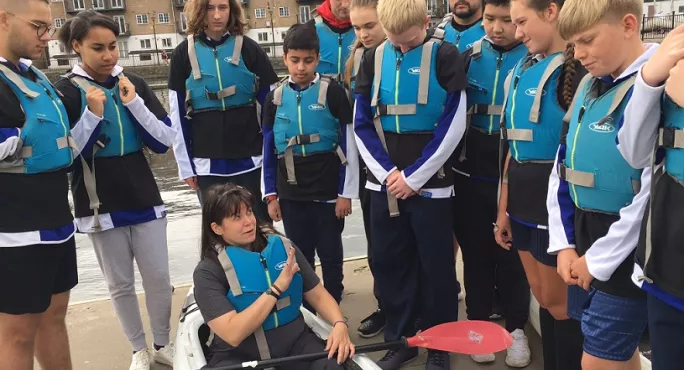- Home
- Long read: The million-dollar teacher gives London pupils a taste of open waters
Long read: The million-dollar teacher gives London pupils a taste of open waters

“She’s the best teacher in the world?” says 12-year-old Aidan Cross. “That’s quite unbelievable. If I saw her walking down the street, I wouldn’t think she was the world’s best teacher.” He pauses. “But she was really, really nice.”
The woman he is referring to is currently lowering herself into a kayak. She is seven months pregnant. It is a reasonable operation. Then she picks up the paddle and kayaks off.
Maggie MacDonnell is the recipient of this year’s $1 million Global Teacher Prize, sponsored by the Varkey Foundation.
Ms MacDonnell, who teaches at the Ikusik School in Salluit, a remote Inuit village in the Canadian Arctic, won Global Teacher Prize because of her use of physical activity - such as kayaking - to counter chronic mental ill health among the pupils in the area.
And now she has come to London to deliver similar lessons to teenagers from Greenwich Free School, in South-East London. Before they begin, Ms MacDonnell filled in the pupils about Inuit life.
‘Hayaking’
“My students get to do some pretty cool stuff, just by living on the land,” she said. “Have you guys ever hunted? Or do you just buy food from the grocery store?”
And the kayak, she added, is a traditional Inuit activity. “It’s actually pronounced ‘hayak’,” she said. “Kayak?”
“No, hayak,” the pupils chorused.
“Kayak?”
“No, hayak!”
Now, the pupils follow Ms MacDonnell, lowering themselves one by one into two-seater kayaks.
“The decades of colonial history that the indigenous people had to survive - the intergenerational trauma,” Ms MacDonnell says. “This is a burden that my students carry with them every day when they come into the classroom.
“Parallel to that, you have a housing crisis, tremendous food insecurity, high rates of drug and alcohol culture. When you mix that all together, unfortunately we’re now in a youth-suicide crisis in Canada, particularly with our indigenous people.”
Global Teacher Prize-winner in action
The Greenwich pupils are all now safely seated in their kayaks and begin paddling around an enclosed area of the Thames.
Unlike the Inuit pupils, Ms MacDonnell says, London teenagers will not be using the kayaks to connect with their heritage. Nonetheless, she believes that they can benefit from the experience as much as their Arctic counterparts.
“Any time you move your body, you’re actually improving your mental health,” she says. “Even 10 minutes’ walk has been shown to improve your mood.”
Adam Guildford, Greenwich head of PE, agrees. He, too, is in a kayak. When the group begins to play a game of riverine tag, two girls drift along beside him, before reaching out and tagging him with their oar.
“The more exercise you do, the happier you are and the more likely you are to enjoy yourself,” he says. “And the happier kids are, going into the classroom, the happier they’re going to be in there as well.”
For Ms MacDonnell, kayaking also offers an opportunity to connect with the nature and the environment, whether in the Arctic Circle or the London Docklands. “We need to evoke within them a passion for environmental stewardship,” she says.
But kayaking is also about acquiring a new skill. “Look at the smiles on their faces,” she says. The game of tag has ended and they are now playing a floating version of British bulldog, racing from one side of the marina to the other.
“They’re learning about team work. They’re communicating with their bodies. Even as you master any new skill, you’re building self-esteem, you’re building self-confidence. And you’re passing that on to other areas of your life, as well.”
Learning outside the school
This is something that Aidan recognises. “In some ways I liked being in a double kayak and in some ways not,” he says. “Like if I wanted to go one way and the other person wanted to go the other way. But we could go really fast, because of the power of two people.”
Looking rather proud of the phrase, Ms MacDonnell announces that not all classrooms need to have four walls.
“I think it’s important that learning doesn’t just happen in the silo of the school,” she says. “The experience that the children are having now would be nearly impossible to replicate in the classroom.”
Thirteen-year-old Riyaad Shahid was kayaking for the first time today. “I was scared,” he says. “I thought I could fall in.”
He has just emerged on to dry land again, reluctantly: he was among the most enthusiastic kayakers, racing about the water and occasionally bashing into classmates.
“Bumping into people I know was kind of fun,” he says. “If you go fast, it’s just like the wind blowing in your face.
“I was actually surprised that I’ve now changed my perception of kayaking, because first I was scared and now I’m really fast at it. It made me feel proud that I can learn fast at it.”
Want to keep up with the latest education news and opinion? Follow Tes on Twitter and like Tes on Facebook
Keep reading for just £1 per month
You've reached your limit of free articles this month. Subscribe for £1 per month for three months and get:
- Unlimited access to all Tes magazine content
- Exclusive subscriber-only stories
- Award-winning email newsletters



